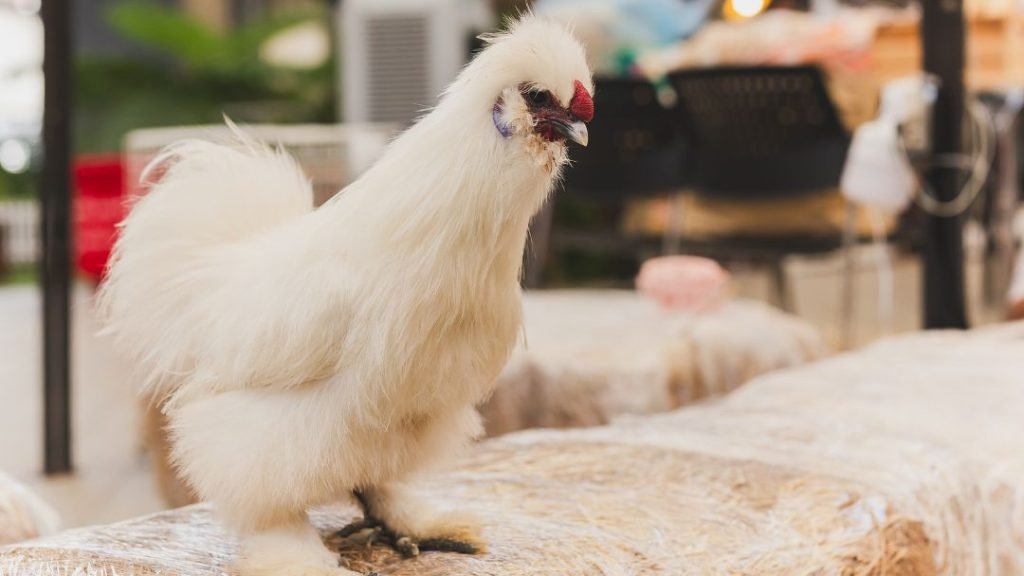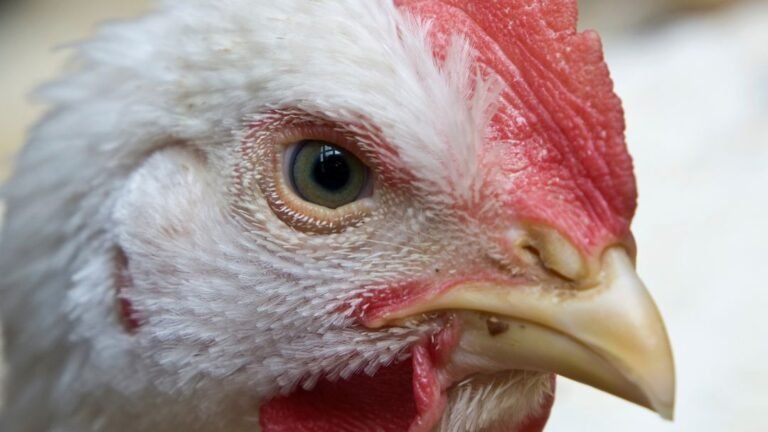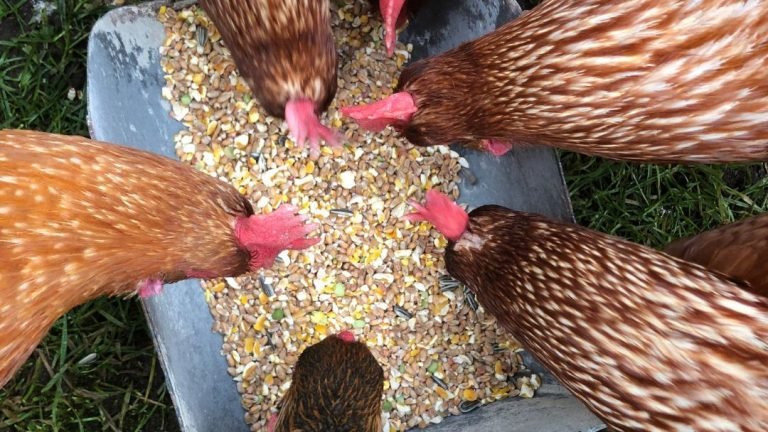To keep chickens cool in summer, provide shade and plenty of fresh water for them to drink. Chickens can easily suffer from heat stress during the hot summer months, which can lead to health issues and even death.
Therefore, it is crucial to take the necessary steps to keep them cool and comfortable. We will discuss some effective strategies for keeping chickens cool in summer. From providing shade in the form of trees or artificial covers to using misters or sprinklers to cool the air, there are various methods you can adopt to lower the temperature for your chickens.
Additionally, ensuring a constant supply of fresh and cool water will help keep them hydrated and maintain their body temperature. By implementing these measures, you can ensure the well-being and productivity of your chickens, even in the scorching summer heat.
Understanding The Importance Of Keeping Chickens Cool
Discover the essentials of keeping chickens cool during the scorching summer months. Learn practical tips and techniques to ensure your feathered friends stay comfortable and healthy in the hottest weather.
Understanding The Importance Of Keeping Chickens Cool
During the scorching summer months, it becomes crucial to ensure that our feathered friends, and chickens, stay cool and comfortable. The hot weather can pose various risks to their well-being, including overheating and heat stress. Therefore, it is our responsibility as caregivers to implement effective measures that enable chickens to beat the heat.
This section will delve into the reasons behind the significance of keeping chickens cool in the summer and the potential risks they face.
Why Is It Crucial To Ensure Chickens Stay Cool In Summer?
- High temperatures can cause chickens to suffer from heat stress, which is a serious condition. They are more prone to overheating than mammals due to their inability to sweat.
- Heat stress can lead to reduced egg production, poor egg quality, and even a complete halt in laying eggs. This outcome is undesirable for those who depend on the birds for eggs.
- Overheated chickens may experience dehydration, decreased feed intake, and weight loss, which could ultimately impact their overall health and vitality.
- In severe cases, extreme heat can cause chickens to suffer from heat stroke, leading to organ failure or death if not promptly addressed.
- Chickens with darker feathers are particularly susceptible to heat stress due to their increased absorption of sunlight, which can elevate their body temperature even further.
By understanding the risks associated with overheating and heat stress in chickens, we can take the necessary precautions to provide them with a cool and comfortable environment during the summer months.

Creating A Comfortable Outdoor Environment
Learn how to create a comfortable outdoor environment for your chickens during the hot summer months with effective tips and tricks to keep them cool and happy.
Creating A Comfortable Outdoor Environment
During the summer months, it is crucial to create a comfortable outdoor environment for your chickens. This ensures that they can stay cool and avoid the harmful effects of heat stress. Here are some important strategies to implement:
Providing Ample Shade For Chickens To Escape The Sun
- Plant trees or install shade cloth: Create shaded areas in your chicken yard by planting trees or installing shade cloth. This will provide a natural and cool spot for your chickens to seek shelter from the sun’s rays.
- Use umbrellas or tarps: Place umbrellas or tarps strategically around the chicken coop and run to provide additional shade. Ensure they are securely anchored to withstand any wind or harsh weather conditions.
- Utilize portable shelters: Consider using portable A-frame shelters that can be moved around the yard. This gives your chickens the flexibility to find shade wherever they are roaming.
Designing And Constructing Proper Chicken Coops And Runs
- Optimal coop positioning: Position your chicken coop in an area that receives shade for a significant part of the day. Avoid direct sunlight exposure during the hottest hours. This will help keep the interior cooler and more comfortable for your chickens.
- Use reflective roofing materials: When building or renovating your chicken coop, choose reflective roofing materials that reflect sunlight instead of absorbing it. This helps to keep the coop cooler.
- Adequate ventilation: Ensure your chicken coop has proper ventilation to allow for airflow. Install windows with wire mesh or vents at various heights to promote natural cross-ventilation and prevent heat buildup.
- Consider coop size and run area: Providing ample space for your chickens inside the coop and in the run is essential. Overcrowding can contribute to heat stress. Aim for at least 5 square feet of indoor space per chicken and a minimum of 10 square feet per bird in the outdoor run.
Strategies For Improving Air Circulation And Ventilation
- Install fans: Use fans to improve air circulation inside the coop. Position them to create a gentle breeze without causing drafts. This helps to cool down your chickens and reduces the risk of respiratory issues.
- Open windows and doors: Open coop windows and doors during the cooler part of the day to allow fresh air to circulate. Ensure predators cannot enter through these openings.
- Dust control: Keep the coop clean to minimize airborne dust particles. Excessive dust can obstruct air circulation and cause respiratory problems for your chickens.
- Elevate the coop: If possible, elevate your chicken coop slightly to promote air circulation underneath. This prevents hot air from getting trapped and helps keep the coop cooler.
By implementing these strategies, you can create a comfortable outdoor environment for your chickens, helping them stay cool and healthy during the summer heat. Remember to monitor your flock regularly and make adjustments as needed to ensure their well-being.
Hydration And Water Management
During the hot summer months, proper hydration and water management are crucial for keeping chickens cool and comfortable. Providing ample fresh water sources and implementing effective cooling strategies can help maintain the well-being of your flock in the heat.
The Importance Of Clean And Fresh Water For Chickens
Chickens need access to clean and fresh water at all times, especially during the hot summer months. Water plays a crucial role in keeping them cool, maintaining their health, and supporting proper bodily functions.
Here’s why clean and fresh water is essential for your chickens:
- Hydration: Just like humans, chickens require water for hydration. It helps regulate their body temperature and prevents dehydration, which can have detrimental effects on their overall health and egg production.
- Nutrient absorption: Water aids in the digestion and absorption of essential nutrients from their feed. Without enough water, chickens may struggle to get the necessary vitamins and minerals, affecting their growth and egg quality.
- Thermoregulation: Chickens do not have sweat glands and rely on panting and drinking water to cool themselves down. Providing clean water ensures they can regulate their body temperature effectively.
- Respiratory health: Clean water helps maintain good respiratory health in chickens. By drinking clean water, they can avoid potential contaminants that may lead to respiratory infections.
Tips For Preventing Water From Heating Up Too Quickly
During scorching summer days, the temperature of the water can rise quickly, making it less appealing for chickens to drink. By following these tips, you can prevent water from heating up too quickly:
- Shade: Place the water containers in shaded areas to minimize direct exposure to sunlight. This simple step can help keep the water cooler for longer periods.
- Insulation: Wrap water containers with a reflective material, such as foil or bubble wrap, to reduce heat absorption from the surroundings.
- Aeration: Consider using water dispensers with built-in valves or nipples that deliver water upon pecking. These types of waterers minimize water waste and reduce the chances of contamination or heating.
- Frozen treats: Provide the chickens with ice blocks or frozen fruits to peck at. These treats not only help cool them down but also provide additional hydration as they melt.
Strategies For Encouraging Chickens To Drink More Water:
Sometimes, chickens may not consume enough water, leading to health issues. Here are some strategies to encourage them to drink more water:
- Multiple water sources: Ensure there are sufficient water containers distributed throughout the chicken coop or run. This accessibility makes it easier for chickens to find water and reduces overcrowding around a single source.
- Clean containers: Regularly clean and refill water containers to prevent the accumulation of dirt, algae, or other contaminants that could discourage chickens from drinking. Fresh water is more enticing!
- Additives: Some chickens may be more inclined to drink water with a splash of apple cider vinegar, a few drops of citrus juice, or a sprinkle of electrolytes. However, it’s essential to consult with a veterinarian before introducing any additives.
- Water temperature: Offer water at room temperature or slightly cooler. Extremely cold water may deter chickens from drinking, especially if they are already hot.
Remember, providing clean and fresh water is crucial in keeping your chickens cool and healthy during the scorching summer months. By following these hydration and water management tips, you’ll ensure your feathered friends have ample access to the vital resources they need to thrive.
Stay tuned for more helpful tips on keeping chickens cool in summer!
Feeding Considerations For Hot Weather
Keep your chickens cool and comfortable during hot summer days with proper feeding considerations. Provide plenty of fresh water and shade, and avoid feeding during the hottest parts of the day. Consider adding electrolytes or frozen treats to their diet to help them stay hydrated.
Adjusting The Feeding Patterns And Timings
During hot summer months, it is crucial to adjust the feeding patterns and timings of your chickens to help them stay cool and avoid heat stress.
Consider the following tips to ensure your chickens’ well-being:
- Divide the daily feedings: Instead of offering one large meal, divide their feedings into smaller portions throughout the day. This approach helps prevent overeating and reduces their metabolic heat production.
- Feed during the cooler parts of the day: Schedule their feedings in the early morning or late evening when the temperatures are lower. This way, they can consume their food when it’s cooler, minimizing the impact of heat on their bodies.
- Provide fresh water frequently: Keep their water supply clean and easily accessible at all times. In hot weather, chickens tend to drink more water to regulate their body temperature and stay hydrated. Ensure the water is cool and not heating up in the sun.
Choosing The Right Types Of Feed For Summer
When it comes to selecting the right types of feed for summer, consider the following options to keep your chickens healthy and comfortable:
- Opt for high-quality, balanced feed: Choose commercial poultry feeds that are specifically formulated for hot weather. These feeds generally contain appropriate levels of protein, vitamins, and minerals to support your chickens’ overall health.
- Consider pelleted or crumbled feed: Pelleted or crumbled feeds are easier for chickens to consume and digest. They also minimize feed wastage, reducing the chances of attracting pests or rodents during the hot season.
- Avoid excessive scratch grains: Scratch grains, such as corn or wheat, can be given sparingly during hot weather. These grains are higher in carbohydrates, which generate more heat during digestion.
Incorporating Cooling And Hydrating Treats Into The Diet
To help your chickens beat the heat and keep them cool and hydrated, consider providing the following treats as part of their diet:
- Fresh fruits and vegetables: Offer treats such as watermelon, cucumbers, or leafy greens which have high water content and provide additional hydration. Chop them into smaller pieces to make it easier for chickens to eat and enjoy.
- Frozen treats: Freeze fruits like berries, grapes, or chopped melons. These frozen treats will not only provide a refreshing and cooling experience but also serve as a source of hydration.
- Electrolyte supplements: In extreme heat, consider adding electrolyte supplements to your water. These supplements help replace essential minerals and electrolytes lost through sweating, assisting in maintaining their overall health and hydration levels.
Remember, by adjusting feeding patterns, selecting the right feed, and incorporating cooling treats, you can ensure your chickens stay comfortable and healthy during the scorching summer months.
Implementing Cooling Techniques
Keeping chickens cool in summer is essential to ensure their health and well-being. By implementing effective cooling techniques, you can create a comfortable environment for your feathered friends. Here are some methods you can use:
Misting Or Spraying Systems To Lower The Ambient Temperature
- Use misting or spraying systems in the chicken coop to provide relief from the heat.
- The fine mist created by these systems helps to cool down the surrounding air.
- Mist the area around the chickens, being mindful not to directly spray the birds.
- Ensure that the misting or spraying system is set on a timer to provide regular cooling throughout the day.
Using Evaporative Coolers To Reduce Heat Stress
- Install evaporative coolers in the chicken coop to lower the temperature and decrease heat stress.
- Evaporative coolers work by drawing in warm air and circulating it through a wet pad, subsequently releasing cooler air.
- These coolers are an effective way to bring the temperature down in enclosed spaces.
- Regularly maintain and clean the coolers to ensure optimal performance.
Natural Cooling Methods Such As Using Wet Bedding Or Frozen Treats
- Provide wet bedding for the chickens to rest on.
- Wet bedding helps to cool their feet and lower their body temperature.
- You can also create frozen treats using fruits, vegetables, or even chicken feed.
- Place these treats in the coop, allowing the chickens to peck at them, providing a refreshing cool-down.
Remember, a combination of these cooling techniques will yield the best results in keeping your chickens cool and comfortable. By maintaining a suitable temperature, you can ensure their health and productivity throughout the hot summer months.
Monitoring And Identifying Signs Of Heat Stress
Maintain cool temperatures for your chickens in the summer by monitoring and identifying signs of heat stress. Protect your flock from heat-related issues by implementing appropriate cooling strategies and keeping a close eye on their behavior and physical condition.
Recognizing Symptoms Of Heat Stress In Chickens
- Lethargy: Chickens suffering from heat stress will appear tired and listless, moving slowly or lying down most of the time.
- Panting: One of the most noticeable signs of heat stress in chickens is excessive panting. You’ll notice their beaks open wide as they try to cool themselves down.
- Wings drooping: Heat-stressed chickens may hold their wings away from their bodies, letting them droop down. This behavior helps them to regulate their body temperature.
- Pale comb and wattles: Chickens with heat stress may have pale or discolored comb and wattles. These are the fleshy parts on top of their heads and under their beaks.
- Reduced egg production: As temperatures rise, egg production in chickens may decrease or even stop completely.
The Importance Of Regular Monitoring And Observations
To ensure the well-being of your chickens during summer, it is crucial to regularly monitor and observe them for signs of heat stress. By keeping a close eye on their behavior and physical appearance, you can take immediate action to prevent further complications.
Regular monitoring allows you to:
- Detect early warning signs: By observing your chickens closely, you can catch the initial symptoms of heat stress and respond promptly to mitigate the situation.
- Assess temperature tolerance: Monitoring helps you understand your flock’s specific heat tolerance level. Some chickens may handle the heat better than others, and recognizing individual differences can aid in implementing appropriate cooling strategies.
- Evaluate the effectiveness of cooling methods: By regularly observing the chickens and assessing their comfort levels, you can determine the effectiveness of the cooling techniques you have implemented and make adjustments if necessary.
Taking Immediate Action To Prevent And Manage Heat Stress
Swift action is vital when combating heat stress in chickens. Here are some measures you can take to prevent and manage heat stress effectively:
- Provide ample shade: Ensure that your coop and outdoor areas offer sufficient shade throughout the day. Trees, awnings, or portable shade structures can help shield chickens from direct sunlight.
- Increase airflow: Promote ventilation by utilizing fans or opening windows and doors to allow fresh air circulation. Good airflow helps dissipate heat and maintain a comfortable environment for chickens.
- Hydration is key: Always ensure a constant supply of clean and cool water for your chickens. Add ice cubes to their water containers to keep it refreshingly cool.
- Mist or sprinkler system: Install a misting or sprinkler system in the coop, creating a fine mist or gentle spray that helps lower the ambient temperature, enhancing comfort for your feathered friends.
- Frozen treats: Offer frozen treats like chilled cucumber slices or watermelon to provide extra hydration and entertainment. These treats also help cool the chickens’ body temperature.
Remember, monitoring and taking immediate action are crucial when dealing with heat stress in chickens. By recognizing symptoms, conducting regular observations, and implementing appropriate measures, you can ensure the well-being of your flock throughout the scorching summer months.
Additional Tips And Strategies
During the hot summer months, it’s important to take extra measures to keep your chickens cool and comfortable. In addition to the basic steps we discussed earlier, such as providing shade and fresh water, here are some additional tips and strategies to help your feathered friends beat the heat:
Utilizing Shade Cloths Or Awnings In The Chicken Coop
- Install shade cloths or awnings in your chicken coop to provide extra protection from the sun. This will help to keep the coop and run area cool.
- Place the shade cloth or awning strategically to ensure that it covers the areas where the chickens spend most of their time.
- Make sure that the shade cloth or awning is securely fastened and won’t pose a safety hazard to the chickens.
Placing Frozen Water Bottles For Chickens To Cool Down
- Freeze some water bottles and place them in your chicken coop or run area. The chickens can then lean against or sit next to the frozen bottles to cool down.
- Replace the frozen water bottles regularly to ensure a constant source of coolness for your chickens.
- Consider using larger frozen water containers, such as jugs, for a longer-lasting cooling effect.
Scheduling Outdoor Activities During Cooler Parts Of The Day:
- Plan any outdoor activities for your chickens, such as free-ranging or dust bathing, during the early morning or late afternoon when temperatures are cooler.
- Avoid letting the chickens roam outside during the hottest parts of the day to prevent overheating.
- Monitor the weather forecast and adjust your schedule accordingly to ensure the safety and well-being of your chickens.
Remember, by implementing these additional tips and strategies in conjunction with the basic measures, you can provide your chickens with a cool and comfortable environment during the scorching summer months.
Conclusion
To ensure your backyard chickens stay cool and healthy during the scorching summer months, it is essential to take a few simple steps. Provide them with proper shade and ventilation, as well as fresh and cool water throughout the day.
Installing misters or sprinklers in their coop can also be beneficial. Consider adjusting their feeding schedule to early morning or late evening when temperatures are lower. Additionally, providing frozen treats such as fruits and vegetables can help keep them cool and hydrated.
Regularly monitoring them for signs of heat stress, such as panting or lethargy, is crucial for their well-being. By implementing these strategies, you can ensure your chickens remain comfortable and thriving during the summer season. Remember, keeping your feathered friends cool is a vital part of responsible backyard chicken-keeping.




